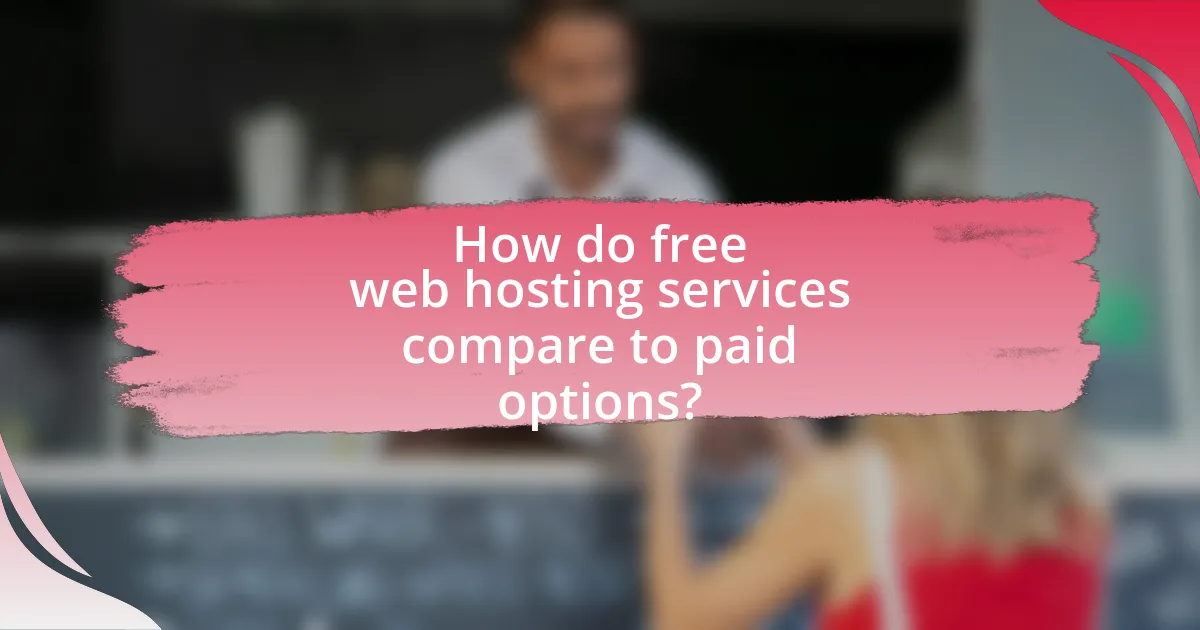The article focuses on the evolving landscape of free web hosting, highlighting current trends such as the integration of artificial intelligence, enhanced security features, and the rise of cloud-based solutions. It examines the increasing demand for free hosting services driven by individuals and small businesses seeking cost-effective online solutions, as well as the technological advancements that are shaping user experiences. Key factors influencing user demographics, challenges faced by providers, and the comparison between free and paid hosting options are also discussed. Additionally, the article explores future developments, including the impact of emerging technologies like AI and blockchain on security and performance in free web hosting.

What are the current trends in free web hosting?
Current trends in free web hosting include the increasing integration of artificial intelligence for website building, enhanced security features, and the rise of cloud-based hosting solutions. AI tools are streamlining the website creation process, allowing users to build sites with minimal technical knowledge. Enhanced security measures, such as SSL certificates and DDoS protection, are becoming standard to protect users from cyber threats. Additionally, cloud-based hosting is gaining popularity due to its scalability and reliability, enabling users to easily upgrade resources as needed. These trends reflect the evolving landscape of free web hosting, catering to user demands for ease of use, security, and flexibility.
How is the demand for free web hosting evolving?
The demand for free web hosting is increasing as more individuals and small businesses seek cost-effective online solutions. This trend is driven by the growing number of startups and entrepreneurs who prioritize budget-friendly options to establish their online presence. According to a report by Statista, the global web hosting market is projected to reach $216 billion by 2025, with a significant portion attributed to free hosting services that cater to users with limited financial resources. Additionally, advancements in technology and the proliferation of website builders have made it easier for users to utilize free hosting platforms, further fueling this demand.
What factors are driving the increase in free web hosting users?
The increase in free web hosting users is primarily driven by the growing demand for accessible online presence among individuals and small businesses. This trend is fueled by the rise of digital entrepreneurship, where users seek cost-effective solutions to establish websites without significant financial investment. Additionally, advancements in technology have made it easier to offer reliable free hosting services, often bundled with user-friendly website builders and templates. According to a report by Statista, the number of websites has surpassed 1.8 billion, indicating a substantial market for free hosting options that cater to new users looking to create an online footprint.
How do user demographics influence free web hosting trends?
User demographics significantly influence free web hosting trends by determining the types of services and features that are prioritized. For instance, younger users, particularly millennials and Gen Z, often seek user-friendly interfaces and mobile compatibility, leading hosting providers to enhance these aspects to attract this demographic. Additionally, geographic factors play a role; users in developing countries may prefer free hosting options due to limited financial resources, prompting providers to offer more accessible services in those regions. According to a 2022 survey by Statista, 45% of users aged 18-24 reported using free web hosting services, highlighting the trend’s correlation with age demographics. This data underscores how user demographics shape the offerings and marketing strategies of free web hosting services.
What technological advancements are impacting free web hosting?
Technological advancements such as cloud computing, containerization, and artificial intelligence are significantly impacting free web hosting. Cloud computing enables scalable resources, allowing free hosting providers to offer more reliable services without substantial infrastructure costs. Containerization, through technologies like Docker, allows for efficient resource management and deployment, enhancing performance and reducing downtime. Artificial intelligence optimizes server management and customer support, improving user experience. These advancements collectively enhance the capabilities and reliability of free web hosting services, making them more competitive in the market.
How is cloud computing changing the landscape of free web hosting?
Cloud computing is transforming the landscape of free web hosting by providing scalable resources and enhanced reliability. Traditional free web hosting often suffers from limited bandwidth and storage, but cloud computing allows providers to offer virtually unlimited resources through distributed networks. This shift enables users to host websites with greater uptime and performance, as cloud services can dynamically allocate resources based on demand. For instance, platforms like Amazon Web Services and Google Cloud offer free tiers that allow users to experiment with hosting without upfront costs, demonstrating the viability of cloud solutions in the free hosting market. As a result, the accessibility and quality of free web hosting are significantly improving, attracting more users and fostering innovation in web development.
What role do content delivery networks (CDNs) play in free web hosting?
Content delivery networks (CDNs) enhance the performance and reliability of free web hosting by distributing content across multiple servers globally. This distribution reduces latency and improves load times for users, as data is served from the nearest geographical location. Additionally, CDNs provide scalability, allowing free web hosting services to handle increased traffic without compromising performance. According to a study by Akamai, websites using CDNs can experience up to a 50% reduction in load times, demonstrating the significant impact CDNs have on user experience in free web hosting environments.
What are the challenges facing free web hosting providers?
Free web hosting providers face several challenges, including limited resources, security vulnerabilities, and monetization issues. Limited resources often result in slower website performance and restricted features, which can deter users. Security vulnerabilities arise from inadequate protection measures, making free hosting services attractive targets for cyberattacks. Additionally, monetization issues complicate sustainability, as providers struggle to generate revenue without compromising user experience through excessive advertisements or upselling premium services. These challenges hinder the growth and reliability of free web hosting services in a competitive market.
How do security concerns affect the viability of free web hosting?
Security concerns significantly undermine the viability of free web hosting by exposing users to risks such as data breaches, malware infections, and lack of support. Free web hosting services often lack robust security measures, making them attractive targets for cybercriminals. For instance, a study by the Cybersecurity & Infrastructure Security Agency (CISA) highlighted that free hosting platforms frequently experience higher rates of security incidents compared to paid services, due to inadequate resources allocated for security protocols. Consequently, users may face compromised websites, loss of sensitive information, and diminished trust from visitors, ultimately affecting the overall sustainability of free web hosting options.
What limitations do users face with free web hosting services?
Users face several limitations with free web hosting services, including restricted storage space, limited bandwidth, and lack of customer support. These services often impose caps on the amount of data that can be stored and transferred, which can hinder website performance and scalability. Additionally, free hosting typically includes advertisements, which can detract from the user experience and brand image. Security features are often minimal or non-existent, leaving websites vulnerable to attacks. Furthermore, users may not have access to essential tools and functionalities, such as custom domain names or advanced analytics, which are crucial for professional online presence. These limitations can significantly impact the effectiveness and reliability of a website hosted on a free platform.

How do free web hosting services compare to paid options?
Free web hosting services typically offer limited features and resources compared to paid options. Paid web hosting generally provides enhanced performance, greater storage capacity, better security, and customer support, which are often lacking in free services. For instance, free hosting may include ads, limited bandwidth, and no custom domain, while paid plans often allow for personalized domains, higher uptime guarantees, and access to advanced tools. According to a 2022 survey by HostingAdvice, 70% of users reported that they experienced slower load times with free hosting, which can negatively impact user experience and SEO rankings.
What are the key differences between free and paid web hosting?
Free web hosting typically offers limited resources, such as storage and bandwidth, while paid web hosting provides more extensive features, including greater storage, bandwidth, and customer support. Free hosting often includes advertisements and lacks a custom domain, whereas paid options allow for personalized domains and generally offer enhanced security and reliability. According to a 2021 survey by HostingAdvice, 70% of users reported that paid hosting services provided better performance and uptime compared to free hosting alternatives.
How do performance metrics differ between free and paid hosting services?
Performance metrics between free and paid hosting services differ significantly in terms of speed, uptime, support, and resource allocation. Paid hosting services typically offer faster loading times due to optimized server configurations and dedicated resources, while free hosting often suffers from slower speeds due to shared resources among many users. Uptime is generally higher in paid services, often exceeding 99.9%, compared to free services that may experience frequent downtimes. Additionally, paid hosting usually includes better customer support, with 24/7 availability, whereas free hosting often lacks reliable support. Resource allocation is also more generous in paid plans, allowing for greater bandwidth and storage, which enhances overall performance.
What features are typically missing in free web hosting plans?
Free web hosting plans typically lack essential features such as custom domain names, sufficient storage space, bandwidth limits, and customer support. These limitations arise because free hosting services often prioritize cost-cutting measures to provide their offerings at no charge. For instance, many free plans require users to use a subdomain instead of a custom domain, which can hinder branding efforts. Additionally, storage and bandwidth are frequently restricted, making them unsuitable for websites with high traffic or large content needs. Furthermore, customer support is often minimal or non-existent, leaving users without assistance when issues arise.
Why might users choose free web hosting over paid options?
Users might choose free web hosting over paid options primarily due to cost savings. Many individuals and small businesses seek to minimize expenses, especially when starting out, and free web hosting provides a no-cost solution to establish an online presence. According to a survey by HostingAdvice, 70% of new website owners prioritize budget constraints, making free hosting an attractive option. Additionally, free web hosting often includes basic features that are sufficient for personal projects or small-scale websites, further incentivizing users to opt for these services.
What are the primary motivations for users opting for free web hosting?
Users primarily opt for free web hosting due to cost savings, ease of use, and the ability to test ideas without financial commitment. Cost savings are significant, as many individuals and small businesses seek to minimize expenses, especially when starting out. Ease of use is another motivation, as free hosting services often provide user-friendly interfaces that require minimal technical knowledge. Additionally, users can experiment with website concepts or personal projects without the risk of losing money, allowing them to gauge interest or functionality before investing in paid hosting solutions.
How does the cost factor influence user decisions in web hosting?
The cost factor significantly influences user decisions in web hosting by determining the affordability and perceived value of hosting services. Users often compare pricing plans to find options that fit their budget while meeting their needs for features, performance, and support. According to a survey by HostingAdvice, 70% of users prioritize cost when selecting a web hosting provider, indicating that lower prices can attract more customers. Additionally, users may opt for free hosting services initially, but as their needs grow, they often transition to paid plans that offer better reliability and support, demonstrating that cost is a critical factor in both initial and long-term hosting decisions.

What future developments can we expect in free web hosting?
Future developments in free web hosting will likely include enhanced performance through improved server technologies and increased integration of artificial intelligence for better user experience. As internet speeds and bandwidth capabilities expand, free web hosting services are expected to offer faster loading times and more reliable uptime. Additionally, the rise of AI can lead to automated customer support and personalized website management tools, making it easier for users to create and maintain their sites. Furthermore, the trend towards sustainability may drive free hosting providers to adopt greener technologies, reducing their carbon footprint while offering services. These advancements are supported by ongoing investments in cloud infrastructure and the growing demand for accessible online presence, indicating a robust future for free web hosting.
How will emerging technologies shape the future of free web hosting?
Emerging technologies will significantly enhance the future of free web hosting by improving resource allocation, scalability, and user experience. Technologies such as artificial intelligence (AI) and machine learning will enable automated resource management, allowing hosting providers to optimize server performance and reduce downtime. For instance, AI algorithms can predict traffic patterns and allocate resources dynamically, ensuring that free hosting services remain reliable even during peak usage times. Additionally, advancements in cloud computing will facilitate the distribution of hosting services across multiple servers, enhancing scalability and redundancy. According to a report by Gartner, the global cloud services market is expected to grow to $832.1 billion by 2025, indicating a strong trend towards cloud-based solutions in web hosting. This shift will likely lead to more robust free hosting options that can accommodate a wider range of user needs while maintaining cost-effectiveness.
What impact will artificial intelligence have on free web hosting services?
Artificial intelligence will significantly enhance free web hosting services by automating resource management and improving user experience. AI algorithms can optimize server performance, predict traffic patterns, and allocate resources dynamically, which leads to more efficient hosting solutions. For instance, AI-driven analytics can identify potential downtimes and automatically adjust server loads, ensuring higher uptime rates. Additionally, AI can personalize user interfaces and support systems, making it easier for users to navigate and utilize hosting features effectively. This trend is supported by the increasing adoption of AI technologies in the tech industry, with a report from Gartner indicating that by 2025, 75% of organizations will be using AI to enhance their operational efficiency.
How might blockchain technology influence free web hosting security?
Blockchain technology can significantly enhance free web hosting security by providing decentralized data storage and immutable transaction records. This decentralization reduces the risk of single points of failure, making it harder for malicious actors to compromise the hosting environment. Additionally, the use of cryptographic techniques in blockchain ensures that data integrity is maintained, as any unauthorized changes would be easily detectable. For instance, a study by the University of Cambridge highlighted that blockchain’s distributed ledger technology can prevent data tampering, thereby increasing trust in free web hosting services.
What trends should users watch for in free web hosting services?
Users should watch for increased integration of artificial intelligence and automation in free web hosting services. This trend is driven by the need for enhanced user experience and efficiency, as AI tools can streamline website management, optimize performance, and provide personalized support. Additionally, the rise of cloud-based solutions is making free hosting more scalable and reliable, allowing users to access resources on-demand. According to a report by Statista, the global cloud computing market is expected to grow significantly, indicating a shift towards cloud-based free hosting options. Furthermore, the growing emphasis on security features, such as SSL certificates and regular backups, reflects users’ increasing concerns about data protection in free hosting environments.
How are user expectations changing in the realm of free web hosting?
User expectations in the realm of free web hosting are shifting towards higher performance, enhanced features, and improved customer support. Users now anticipate faster loading times, greater uptime reliability, and more robust security measures, reflecting a growing demand for quality even in free services. According to a 2023 survey by HostingAdvice, 70% of users indicated that they would choose a free hosting service based on its speed and security features, highlighting the importance of these factors in user decision-making. Additionally, users increasingly expect intuitive interfaces and easy-to-use tools for website creation, as evidenced by the rise in popularity of platforms that offer drag-and-drop functionality and customizable templates.
What innovations are likely to emerge in free web hosting offerings?
Innovations likely to emerge in free web hosting offerings include enhanced AI-driven website builders, improved security features, and integrated e-commerce solutions. AI-driven website builders will simplify the design process, allowing users to create professional-looking sites with minimal effort, as evidenced by the increasing adoption of AI tools in various tech sectors. Improved security features, such as automated SSL certificate provisioning and advanced DDoS protection, will address growing concerns over online safety, reflecting industry trends where security is paramount. Additionally, integrated e-commerce solutions will enable users to set up online stores without upfront costs, aligning with the rise of online shopping and the need for accessible digital commerce platforms.
What best practices should users follow when choosing free web hosting?
Users should prioritize reliability, features, and support when choosing free web hosting. Reliable hosting ensures minimal downtime, which is crucial for maintaining website accessibility. Features such as storage space, bandwidth, and the ability to use custom domains are essential for functionality. Additionally, users should consider the level of customer support available, as responsive assistance can resolve issues quickly. According to a survey by HostingAdvice, 70% of users reported that customer support significantly influenced their satisfaction with hosting services. Therefore, evaluating these aspects can lead to a more effective choice in free web hosting.
How can users assess the reliability of free web hosting providers?
Users can assess the reliability of free web hosting providers by evaluating uptime guarantees, user reviews, and the provider’s support options. Uptime guarantees indicate the expected availability of the service, with reputable providers typically offering at least 99.9% uptime. User reviews on platforms like Trustpilot or Reddit provide insights into real experiences, highlighting issues such as downtime or customer service responsiveness. Additionally, reliable providers often offer multiple support channels, including live chat, email, and forums, which can be indicative of their commitment to customer satisfaction.
What common pitfalls should users avoid with free web hosting services?
Users should avoid several common pitfalls when utilizing free web hosting services. One major pitfall is the lack of reliability, as many free hosts experience frequent downtime, which can negatively impact website accessibility and user experience. Additionally, users often face limited storage and bandwidth, restricting their website’s growth and performance. Security is another concern, as free hosting services may not provide adequate protection against cyber threats, leaving users vulnerable to data breaches. Furthermore, users should be cautious of hidden fees or unexpected charges that can arise when upgrading services or removing ads. Lastly, the absence of customer support can hinder users when technical issues arise, making it difficult to resolve problems promptly.















